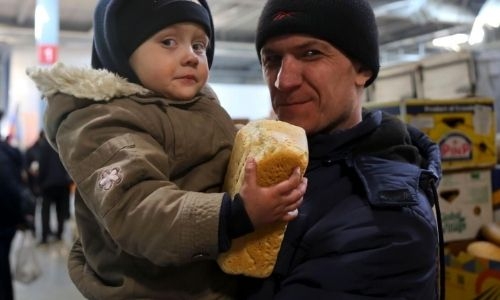Ukraine crisis threatens food supplies in parts of the Arab world
Agencies | Kyiv
The Daily Tribune – www.newsofbahrain.com
Layal Aswad was already exhausted by Lebanon’s devastating two-year economic collapse. Now, as Russia’s attack on Ukraine sends food and energy prices soaring even further, she finds herself struggling to put food on the table for her family of four.
“Even bread is not something we take for granted anymore,” said the 48-year-old housewife, standing recently in a supermarket aisle in front of gallons of cooking oil whose prices had risen to an all-time high.
From Lebanon, Iraq and Syria to Sudan and Yemen, millions of people in the Middle East whose lives were already upended by conflict, displacement and poverty are now wondering where their next meals will come from. Ukraine and Russia account for a third of global wheat and barley exports, which countries in the Middle East rely on to feed millions of people who subsist on subsidized bread and bargain noodles. They are also top exporters of other grains and the sunflower seed oil that is used for cooking.
Even before the crisis in Ukraine, people in countries across the Middle East and North Africa were not getting enough food to eat. Now with trade disruptions spurred by the conflict, more commodities are becoming either unaffordable or unavailable.
“Put simply, people cannot afford food of the quality or quantity that they need, with those in conflict- and crisis-affected countries ... at greatest risk,” said Lama Fakih, Middle East and North Africa Director at Human Rights Watch.
A similar set of circumstances led to a series of uprisings starting in late 2010 known as the Arab Spring, when skyrocketing bread prices fueled anti-government protests across the Middle East, noted Kristalina Georgieva, managing director of the International Monetary Fund.
“When prices jump, and poor people cannot feed their families, they will be on the streets,” Georgieva remarked Sunday at the Doha Forum, a policy conference in Qatar.
In Iraq and Sudan, public frustration at food prices and a lack of government services erupted in street protests on several occasions over the past several weeks.
“People have a right to food, and governments should do everything in their power to protect that right, otherwise we risk not only food insecurity but the insecurity and instability that gross deprivation on this scale could trigger,” Fakih said.
The crisis also has sparked concern that much of the international aid upon which so many in the Arab world depend will be diverted to Ukraine, where more than 3.7 million people have fled the crisis, Europe’s largest exodus since World War II.
“For the millions of Palestinians, Lebanese, Yemenis, Syrians, and others who live in countries experiencing conflict, catastrophic economic meltdowns, and increasing humanitarian needs, this would be equivalent to shutting down critical life support,” states an analysis released by Carnegie Middle East experts last week.
In Syria, 14.6 million people will depend on assistance this year, 9 per cent more than in 2021 and 32 per cent more than in 2020, Joyce Msuya, the United Nations’ assistant secretary-general for humanitarian affairs and deputy emergency relief coordinator, told the UN Security Council in February.
A recent report by the UN and international aid groups estimated that more than 160,000 people in Yemen were likely to experience famine-like conditions in 2022. That number could climb much higher still because of the crisis in Ukraine. A UN appeal for the country earlier this month raised $1.3 billion, less than a third of what was sought.
“I have nothing,” said Ghalib Al Najjar, a 48-year-old Yemeni father of seven whose family has lived in a refugee camp outside the rebel-held capital of Sanaa since fleeing fighting in their middle-class neighborhood more than four years ago. “I need flour, a package of flour. I need rice. I need sugar. I need what people need (to survive).”
In Lebanon, which has been in the throes of economic collapse for the past two years, panic has set in among a population worn down by shortages of electricity, medicine and gasoline.
The country’s main grain silos were destroyed by a massive explosion at a Beirut port in 2020. Now, with just six weeks of wheat reserves, many fear even darker days ahead. Several large supermarkets were out of flour and corn oil this week.
“Whatever is put on shelves is being bought,” said Hani Bohsali, head of the food importers syndicate. He said 60 per cent of the cooking oil consumed in Lebanon comes from Ukraine and the rest comes mostly from Russia.
“This is not a small problem,” he said. Bohsali noted that a search is underway for alternative places from which to import needed products, but he said other countries have either banned food exports or significantly raised prices.
Related Posts

